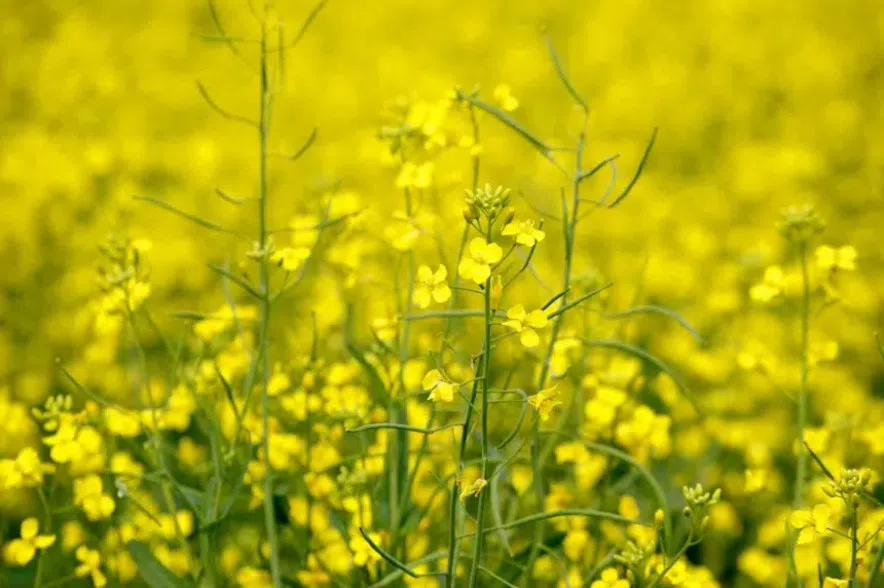Tariffs have been top of mind for people across the country for months now, so it only makes sense that it would be a top issue as people head to the federal election polls.
In Saskatchewan, tariffs are already having an effect.
The tariff on Canadian steel going into the U.S. has raised concerns for steel workers in Regina, and canola farmers are worried about their future after China put a 100 per cent tariff on canola oil and meal, among other Canadian commodities.
Though the economy-wide tariff on Canada threatened by the U.S. administration hasn’t fully been implemented, the threat of it and comments about Canada becoming the 51st state have kept many shoppers away from American goods.
Jason Childs, economics professor at the University of Regina, said the canola tariff is the one that will really stand out for Saskatchewan.
“We’re one of the major producers of canola in the world, so when we get hit, that’s going to take a big bite out of what we do here,” he explained.
In 2024, Saskatchewan produced 55 per cent of Canada’s canola, and in 2023, Saskatchewan was the world’s leading exporter, by dollar value, of canola oil, according to the provincial government.
However, there’s been almost no talk on the campaign trail about the Chinese tariffs, which Childs said is alarming.
“It suggests that this is not being taken terribly seriously at the highest levels. Perhaps somebody’s working very quietly behind the scenes, and that might be the appropriate way to approach this, particularly with the Chinese issue, but there’s nothing that I can point my finger at and say, ‘Yes, this is being worked on,’” said Childs.
He believes the reason federal leaders aren’t racing to talk about this tariff is because it’s a retaliation over Canada’s 100 per cent tariff on Chinese electric vehicles – a move made in tandem with the United States.
Going into the U.S., there are tariffs on automobiles, lumber, steel and aluminum. Childs said the steel tariff will likely be the biggest problem for Saskatchewan out of that group.
“I think the steel tariffs are likely here to stay for a while, so I would be very concerned there. And I don’t foresee a whole lot of relief,” said Childs.
There’s also the threat of an across-the-board tariff on Canadian goods, but Childs said the free trade agreement, CUSMA, is protecting most of the Canadian economy. He said renegotiation could be a way to get out of that problem, but that would require knowing what the other side wants, and Childs said that’s difficult to suss out from the U.S. right now.
The Canadian response to the U.S. tariffs has been a suite of countertariffs on American goods, a move which Childs doesn’t agree with.
“Generally speaking, when you’re a small, open economy and you get hit with tariffs by one of your major trading partners, the best response is no response,” he said.
Childs said some of the rhetoric around this situation can be attributed to the fact that the country is in the middle of an election campaign. He said the country is huffing and puffing to show how tough and strong we are, but said he thinks it will calm down somewhat after the election.
Federal candidates weigh in
Regina Liberal candidate Jeff Walters said the Liberal leader, Mark Carney, will put together a team Canada after the election to directly renegotiate with China and the U.S.
“I think, after the election, you’re going to see some of the rhetoric come down a bit with regard to who is going to be involved in that and who’s not,” said Walters.
He admitted the counter-tariffs implemented by the current Liberal government would hurt people buying those American goods, but said the point is to get shoppers to move to Canadian products and get to a system less dependent on the U.S.
“The counter-tariffs are, I believe, more in reconfiguring people’s minds and purposeful of what they’re actually buying in the hopes that they go more domestic,” said Walters.
Michael Kram, Regina Conservative candidate, said the Conservatives are opposed to a tariff system, but in the short term, if elected to government, would put in retaliatory dollar-for-dollar tariffs on the U.S.
“But we will be particular about the tariffs that we will impose, we will focus on tariffs on goods that we import from the United States but on things that we also produce here in Canada so that it will be easier to buy Canadian and Canadians can make that transition from American imports,” said Kram.
He said the money from those tariffs would be put into supports for businesses and workers who are affected by the U.S. tariffs.
Conservative leader, Pierre Polievre, has also said his party would push to renegotiate CUSMA early to try to get out of the tariff environment.
Chris Simmie, Regina candidate for the NDP, said the global order and Canada’s relationship with the U.S. has evolved, so Canada needs to evolve and build an economy by and for Canadians.
“This is the path to do that, strengthening ourselves and finding new partners to work with, and making sure that we have diverse trading relationships and that in the future we don’t put all our eggs in one basket,” said Simmie.
The tariff situation continues to be top of mind for people across the country, and will doubtless be a consideration for many as they head to the ballot box. Election Day is April 28.











